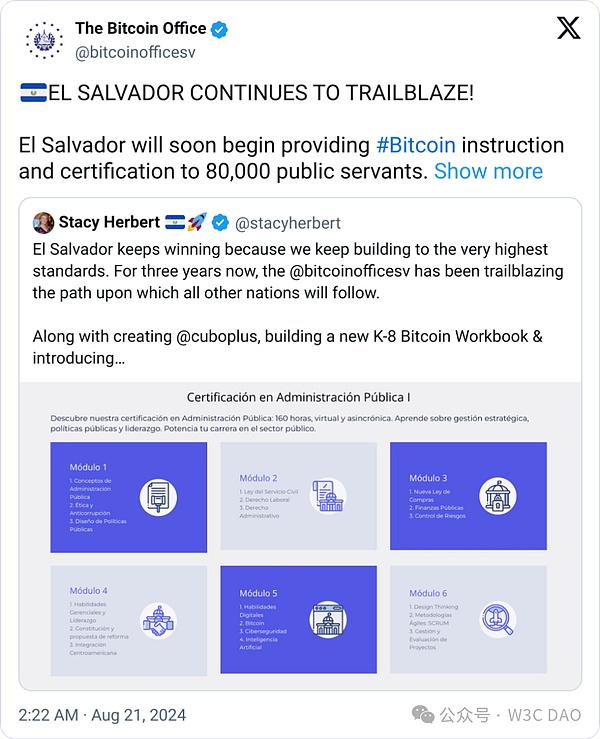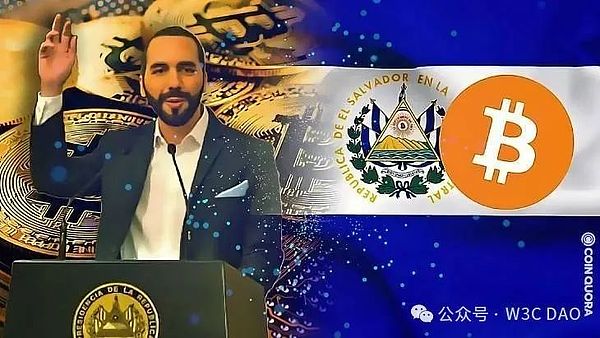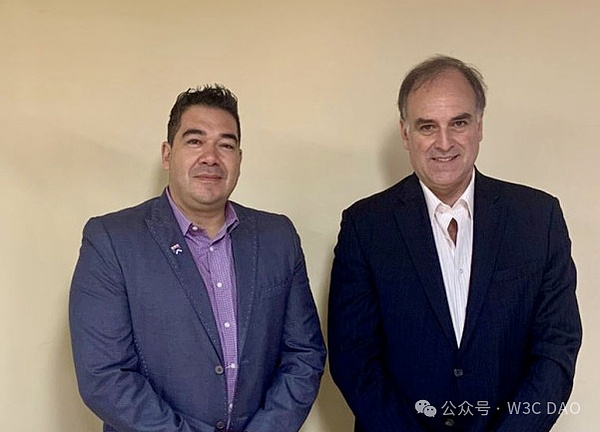El Salvador's big move
The Salvadoran Bitcoin Office announced that 80,000 civil servants will receive Bitcoin instruction and certification through the educational module of the Higher School of Public Administration Innovation (ESIAP) program. The module also includes training in the fields of cybersecurity, blockchain and artificial intelligence (AI), and provides a certificate in public administration.

The Salvadoran Bitcoin Office is an agency responsible for overseeing all Bitcoin-related projects.
Previously, President Nayib Bukele established ESIAP in August 2021, responsible for "strengthening public administration through the implementation of training and research programs for all civil servants and public officials throughout the country."
The Bitcoin topic is part of the Public Administration certification module, which has nine different modules that can be completed virtually and asynchronously in 160 hours. The seventh module includes the Bitcoin topic, but also other related topics such as blockchain, cybersecurity, and artificial intelligence (AI).

Building a National Workforce That Accepts Bitcoin
ONBTC Director Stacy Herbert expects that training public servants will have a “compounding effect” on El Salvador’s Bitcoin-driven economy. She believes this and plans to announce more educational initiatives. “These educational programs have a very low time preference commitment for the long-term success of El Salvador and its Bitcoin (and technology) policy,” she said. The Bitcoin certification activity was initiated by the Higher School of Public Administration Innovation (ESIAP), which was inaugurated by President Nayib Bukele in August 2021. According to ONBTC, also known as the “Bitcoin Office,” the course is specifically designed to “strengthen the standards of excellence in governance and public administration in El Salvador.” Bitcoin adoption in El Salvador is set to see a new boom. Previously, the Salvadoran government launched an initiative to reform the current banking law, introducing a new type of bank that can provide Bitcoin and cryptocurrency services.
The banking bill, which has been submitted to the National Congress's Science, Technology, Tourism and Investment Committee, includes 14 new articles that define private investment banks (PIBs) as "internationally important instruments for promoting economic development and facilitating the channeling of financial resources to commercial and government projects".

Sponsored Business Content
If the proposal is passed, it will allow the creation of these banks, offering different services, including economic risk management, purchase of financial products, investment management, hedging and other financial derivatives. These services will support any legal currency in El Salvador, such as the US dollar and Bitcoin.
In addition, the bill explicitly states that stablecoin-based instruments are supported, opening the door to cryptocurrency-based investment tools. Nevertheless, the requirements for launching a PIB are very strict: these companies should have a capital of $50 million at the time of their establishment.
Argentina Learns from El Salvador’s Bitcoin Adoption
El Salvador’s financial success with Bitcoin has caught the attention of other hyperinflationary economies.
In May, the Argentine government began working with El Salvador to learn from its adoption of Bitcoin and other cryptocurrency activities.
Argentina’s securities regulator, the National Securities Commission (CNV), met with El Salvador’s National Digital Asset Commission (CNAD) to discuss cryptocurrency adoption and regulation in both countries.

During the meeting, CNV Chairman Silva said:
"We want to strengthen our ties with the Republic of El Salvador, so we will explore the possibility of signing a cooperation agreement with them."
In addition, Argentina recently passed registration requirements for cryptocurrency companies in April and has been actively experimenting with cryptocurrencies since Bitcoin-friendly politician Javier Milei became president of Argentina at the end of 2023.
 Aaron
Aaron














